
In the first session, Prof. Wolfgang Glänzel presented the topic of quantitative science studies and research evaluation. In the session, he introduces the construction of quantitative scientific indicators to measure research performance.
.jpg) | Prof. Wolfgang Glänzel is the official Professor at KU Leuven University (Belgium) and Editor-in-Chief of Scientometrics (Germany). Prof. Wolfgang Glänzel started the presentation with a history of scientific citation and the development of Quantitative Science (Scientometrics), Prof. Wolfgang Glänzel emphasizes that the process from bibliographic data to appropriate quantitative scientific indicators in the measurement of research effectiveness is immensely complex; At the same time, the Professor also clarified the factors that constitute the relevance of the data source, the quality and the cleanliness of the data. |
Regarding the rationality of the methodology, the Professor pointed out the theoretical and conceptual problems of the quantitative scientific indicator, the prerequisites for applying this indicator to the research. Furthermore, concerning topic granularity and aggregation, data is provided based on a subject classification system and is consistent with certain levels of detail. Therefore, Prof. Wolfgang Glänzel recommends using a different level of quantitative science in combination with a qualitative research method based on a specific portfolio of studies.
Additionally, Prof. Wolfgang Glänzel discusses quantitative science, emphasizing the measurement of a particular type of information outside of academic research that enables responsible or fiduciary individuals to make certain value judgments – regarding the place of scientific products in the body of knowledge.

MSc. Huynh Luu Duc Toan (UEH-JABES) – Representative of the ACBES Conference 2021 Organizing Committee introduced the attendees and two Keynotes of the Workshop
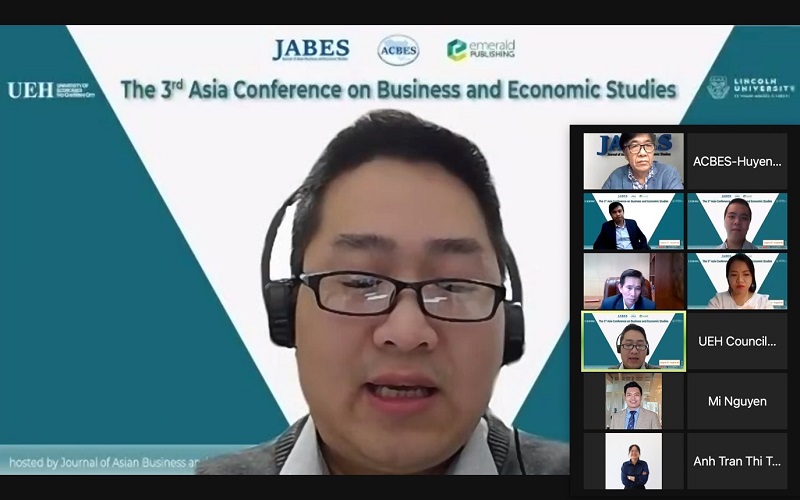
MSc. Khanh Hoang (Lincoln University, New Zealand) – Representative of the ACBES Conference 2021 Organizing Committee briefly introduced the biography of Prof. Wolfgang Glänzel
.jpg)
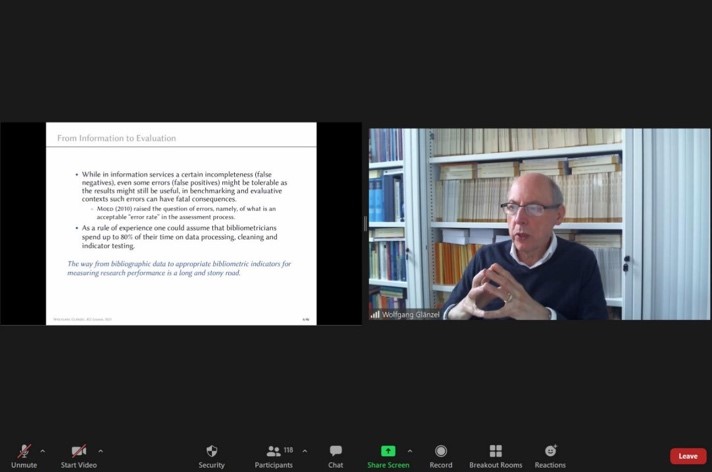
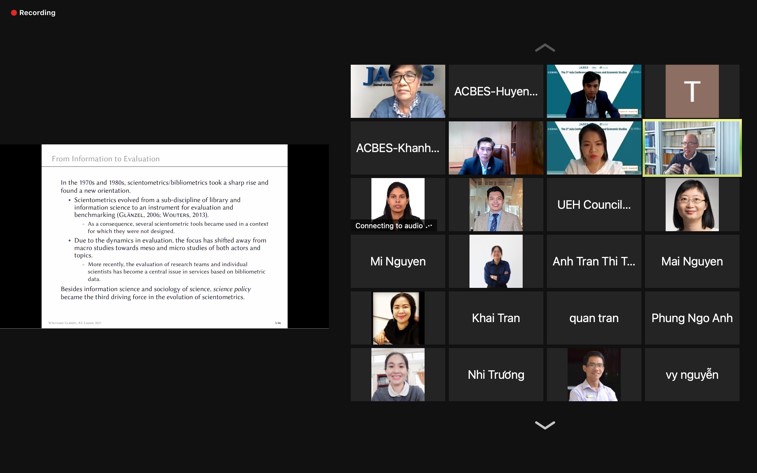 Prof. Wolfgang Glänzel presented his research
Prof. Wolfgang Glänzel presented his research
.jpg)
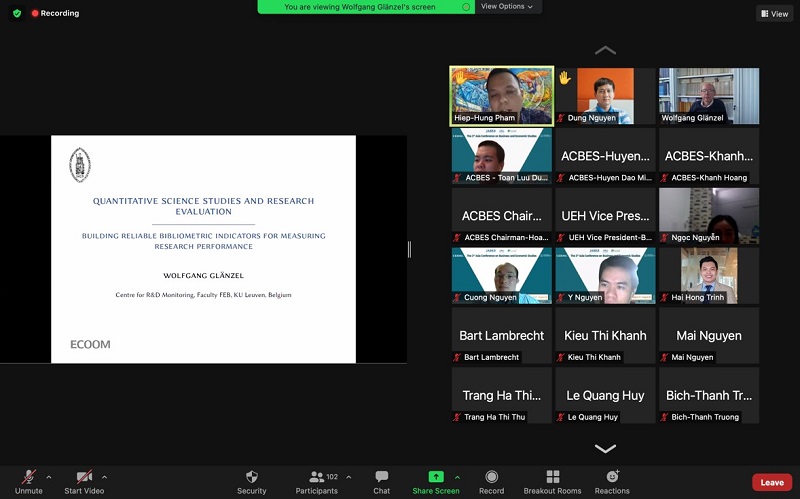
.jpg)
The researchers asked questions and discussed rationally with Prof. Wolfgang Glänzel
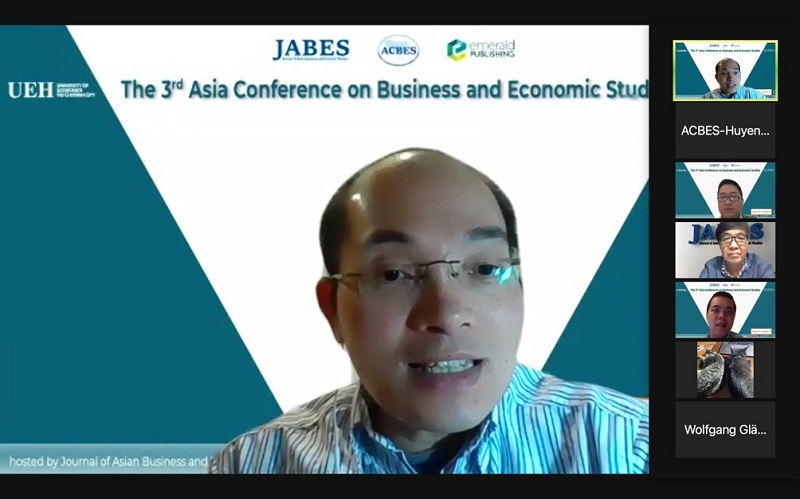
Cuong Nguyen (Lincoln University, New Zealand) - Representative of the ACBES Conference 2021 Organizing Committee thanked Prof. Wolfgang Glänzel


The researchers took a photo to summarize the first Workshop session with Prof. Wolfgang Glänzel
In the second session, Prof. Scott Cunningham introduces researchers to crucial aspects of causal inference.
.jpg) | Prof. Scott Cunningham is a professor of economics at Baylor University (USA) and Editor-in-Chief of Technological Forecasting and Social Changes. Prof. Scott Cunningham often researches topics related to mental health, policies related to prostitution, abortion and drugs. Participating in the second session of the Workshop, Prof. Scott Cunningham presents the main aspects of causal inference through introducing his famous book "Causal Inference: The Mixtape". This book describes the methods and econometric estimation tools which were developed from popular econometric methods and widely used by social scientists historically. |
Prof. Scott Cunningham said that Causal Inference is different from Predictive Modeling. Predictive Modeling defines the process of developing a model to understand and quantify the model's prediction accuracy on unseen future data. And unlike Predictive Modeling, Causal Inference is discusses by Prof. Scott Cunningham in his book "Causal Inference: The Mixtape"; Accordingly, when analyzing causal effects, it is necessary to consider other aspects. In addition, there should be assumptions in each study required to define the target parameter based on knowledge of the phenomenon and make definite assumptions on causal questions; then, use an appropriate estimator of information inference tools and methods.
To illustrate the causal inference method, Prof. Scott Cunningham cites research on the causal impact on Rhode Island (USA) of changing prostitution policy. In this study, the Professor estimated the average causal impact of policy changes on violent behavior and unambiguously estimated health outcomes if Rhode Island did not legalize prostitution. During the research on prostitution policy in Rhode Island, Prof. Scott Cunningham has thoroughly researched the laws and history of this locality. He found that when Rhode Island legalized prostitution in 2003, it reported a 30% reduction in rape rates, a 40% reduction in gonorrhea in women from the people who were treated in this locality; and this is explained by the participation of women who know about health care and are concerned about the risk of sexually transmitted diseases (STDs).
To get this special research, Prof. Scott Cunningham took almost ten years to be announced. He further emphasized that causal analysis should rely on available data and regression techniques, and scholars should know the economic theory, expertise of the field or general background knowledge.
.jpg)
Prof. Scott Cunningham presented his research
.jpg)
.jpg)
The researchers raised questions and discussed with Prof. Scott Cunningham
.jpg)

Prof. Nguyen Trong Hoai (UEH-JABES) – Head of the Organizing Committee of ACBES Conference 2021 gave a speech of thanks and discussion relating to the two keynotes of the Workshop. At the same time, he also shared with researchers about the research direction for Vietnam and the orientation and encouragement of articles sent to JABES in the coming time.
.jpg)
.jpg)
The researchers took a photo together to summarize the Workshop
For more information:
All JABES new information and events such as ACBES International Scientific Conference, JST series and many other events will be continuously updated on JABES official channels as follows: